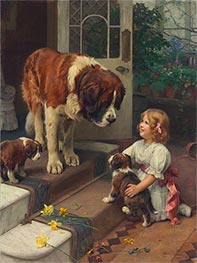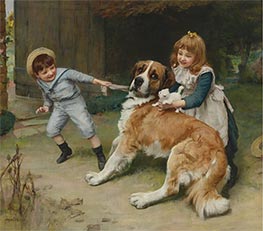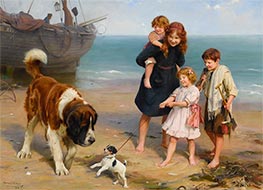
Arthur John Elsley Painting Reproductions 1 of 1
1860-1952
British Romanticism Painter
Arthur John Elsley’s work occupies a unique and sentimental corner of late Victorian and Edwardian art, a time when images of children and their pets seemed to encapsulate the domestic bliss and innocence of an idealized English life. Born on November 20, 1860, in London, Elsley’s trajectory into this nostalgic world began under less-than-ideal circumstances. His father, John Elsley, was an amateur artist and coachman, and it was in this environment that Arthur first encountered art - but also hardship. John’s battle with illness forced him to give up his career, and the family faced financial strain. Despite these early challenges, the spark of creativity in Arthur was evident from a young age.
Elsley’s earliest known drawing, made when he was just eleven, was of a terrier - a subject that hinted at the animal-filled scenes that would later define his career. His sketches from visits to the Zoological Gardens were already marked by a keen observational eye. In 1874, at just fourteen, Elsley enrolled in the South Kensington School of Art, which would later become the Royal College of Art. However, a bout of measles left him with impaired eyesight, a condition that would trouble him throughout his life and influence his method of working.
By the late 1870s, Elsley was studying at the prestigious Royal Academy Schools, where his skill was honed under some of the leading artists of the day. His first major exhibition at the Academy in 1878, "A Portrait of an Old Pony," hinted at his future focus on animals and domestic scenes. But tragedy struck shortly afterward - his father passed away just as Elsley’s career was beginning to take shape. Yet, these early years were crucial in setting the foundations for his later successes.
Elsley’s real break came through his association with Frederick Morgan, a well-known genre painter specializing in scenes of children. Elsley’s strength lay in his ability to paint animals, particularly dogs, and this partnership allowed both artists to enhance their work. One of his most famous paintings, "I’se Biggest" (1892), featuring a little girl comparing her height to that of a massive St. Bernard, became an immediate sensation. Its popularity was such that it had to be re-engraved due to high demand for reproductions.
The success of "I’se Biggest" marked the beginning of a long period of popularity for Elsley, whose paintings found their way onto calendars, advertisements, and Christmas cards, making his work widely accessible to the growing middle class. His compositions, rich with humor and sentimentality, captured the imagination of an audience seeking comfort and familiarity in their art. He painted an idealized world where children played innocently with their pets - a vision of life that resonated deeply with the public of his time.
However, Elsley’s relationship with Morgan soured in the late 1890s, and the two parted ways. This rift didn’t halt his productivity; in fact, Elsley began to produce larger, more ambitious works that incorporated multiple figures. His use of children, animals, and pastoral settings became more elaborate, though critics occasionally remarked on issues with perspective, possibly exacerbated by his worsening eyesight.
The First World War marked a decline in Elsley’s output. His eyesight deteriorated, and he took a job in a munitions factory, a role that strained his vision further. By the 1920s, he was painting less frequently, though he continued to exhibit until 1927. Arthur John Elsley passed away in 1952, his work largely forgotten by then, though in his lifetime he had been one of the most commercially successful artists in Britain.
Elsley’s legacy today is one of warmth, humor, and nostalgia. His paintings are not challenging or radical, but that was never the point. They capture a particular moment in time when the public yearned for images of innocence and simplicity - a moment when the sight of a child and her dog could evoke pure joy. And perhaps, in a world filled with uncertainty, that is precisely why his work continues to resonate.
Elsley’s earliest known drawing, made when he was just eleven, was of a terrier - a subject that hinted at the animal-filled scenes that would later define his career. His sketches from visits to the Zoological Gardens were already marked by a keen observational eye. In 1874, at just fourteen, Elsley enrolled in the South Kensington School of Art, which would later become the Royal College of Art. However, a bout of measles left him with impaired eyesight, a condition that would trouble him throughout his life and influence his method of working.
By the late 1870s, Elsley was studying at the prestigious Royal Academy Schools, where his skill was honed under some of the leading artists of the day. His first major exhibition at the Academy in 1878, "A Portrait of an Old Pony," hinted at his future focus on animals and domestic scenes. But tragedy struck shortly afterward - his father passed away just as Elsley’s career was beginning to take shape. Yet, these early years were crucial in setting the foundations for his later successes.
Elsley’s real break came through his association with Frederick Morgan, a well-known genre painter specializing in scenes of children. Elsley’s strength lay in his ability to paint animals, particularly dogs, and this partnership allowed both artists to enhance their work. One of his most famous paintings, "I’se Biggest" (1892), featuring a little girl comparing her height to that of a massive St. Bernard, became an immediate sensation. Its popularity was such that it had to be re-engraved due to high demand for reproductions.
The success of "I’se Biggest" marked the beginning of a long period of popularity for Elsley, whose paintings found their way onto calendars, advertisements, and Christmas cards, making his work widely accessible to the growing middle class. His compositions, rich with humor and sentimentality, captured the imagination of an audience seeking comfort and familiarity in their art. He painted an idealized world where children played innocently with their pets - a vision of life that resonated deeply with the public of his time.
However, Elsley’s relationship with Morgan soured in the late 1890s, and the two parted ways. This rift didn’t halt his productivity; in fact, Elsley began to produce larger, more ambitious works that incorporated multiple figures. His use of children, animals, and pastoral settings became more elaborate, though critics occasionally remarked on issues with perspective, possibly exacerbated by his worsening eyesight.
The First World War marked a decline in Elsley’s output. His eyesight deteriorated, and he took a job in a munitions factory, a role that strained his vision further. By the 1920s, he was painting less frequently, though he continued to exhibit until 1927. Arthur John Elsley passed away in 1952, his work largely forgotten by then, though in his lifetime he had been one of the most commercially successful artists in Britain.
Elsley’s legacy today is one of warmth, humor, and nostalgia. His paintings are not challenging or radical, but that was never the point. They capture a particular moment in time when the public yearned for images of innocence and simplicity - a moment when the sight of a child and her dog could evoke pure joy. And perhaps, in a world filled with uncertainty, that is precisely why his work continues to resonate.
3 Arthur John Elsley Paintings

Here He Comes 1917
Oil Painting
$1735
$1735
Canvas Print
$62.01
$62.01
SKU: AJE-18050
Arthur John Elsley
Original Size: 83.2 x 62.2 cm
Private Collection
Arthur John Elsley
Original Size: 83.2 x 62.2 cm
Private Collection

Friend or Foe 1891
Oil Painting
$1661
$1661
Canvas Print
$72.69
$72.69
SKU: AJE-18051
Arthur John Elsley
Original Size: 88.9 x 101.6 cm
Private Collection
Arthur John Elsley
Original Size: 88.9 x 101.6 cm
Private Collection

An Unlikely Pair 1915
Oil Painting
$1845
$1845
Canvas Print
$59.75
$59.75
SKU: AJE-18052
Arthur John Elsley
Original Size: 78.4 x 109.2 cm
Private Collection
Arthur John Elsley
Original Size: 78.4 x 109.2 cm
Private Collection